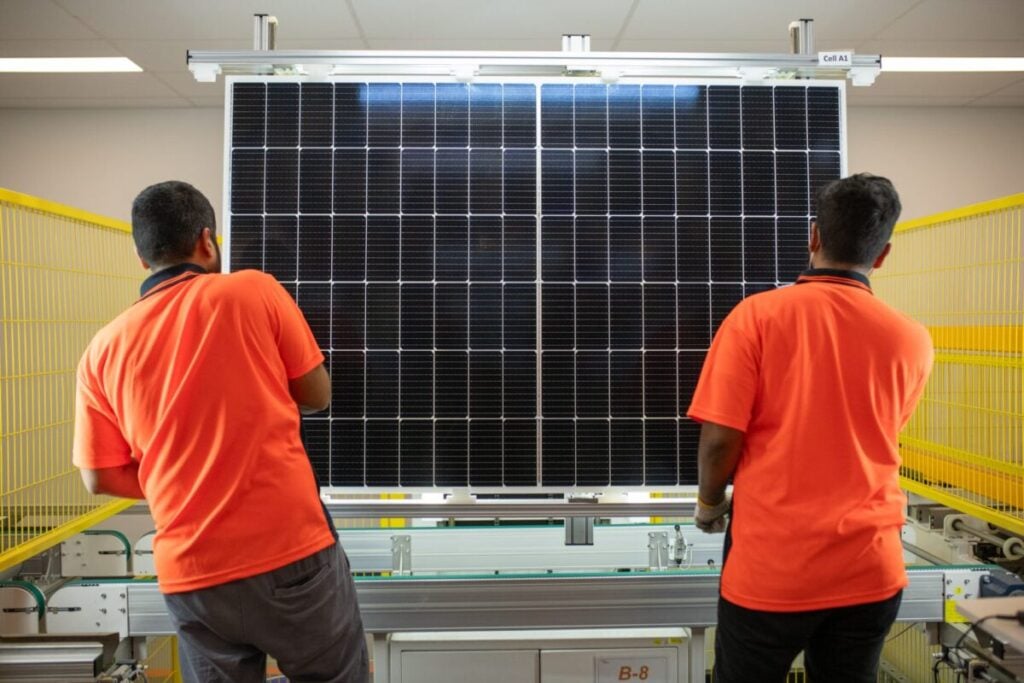
The Australian Renewable Energy Agency (ARENA) has announced that three companies will receive AU$45.5 million (US$29.5 million) in funding through the Solar Sunshot Program.
The government entity confirmed this morning (6 August) that it had provided the funding to Tindo Solar, an Australian module manufacturer, Solquartz, Energus and Stellar PV.
Try Premium for just $1
- Full premium access for the first month at only $1
- Converts to an annual rate after 30 days unless cancelled
- Cancel anytime during the trial period
Premium Benefits
- Expert industry analysis and interviews
- Digital access to PV Tech Power journal
- Exclusive event discounts
Or get the full Premium subscription right away
Or continue reading this article for free
As confirmed by ARENA, most of the funding, AU$34.5 million to be precise, will be allocated to Tindo Solar. This funding will help Tindo Solar increase its module production from 20MW to 180MW per year and renovate its Mawson Lakes factory in South Australia to produce at a greater scale and a lower cost base.
Tindo confirmed it would introduce advanced automation and expand its product range to include premium N-type solar modules.
The Solar Sunshot Program support also includes a Manufacturing Production Credit (MPC) and a capital grant, which will support a feasibility study for developing a future gigafactory capable of producing up to 1GW of solar modules per annum.
This solar gigafactory facility could require an approximate AU$100 million investment, generate 250 jobs, and produce 7,000 solar modules daily.
Tindo Solar indicated that while the location of the solar gigafactory remains undetermined, they are exploring potential sites in regional New South Wales, Queensland and Victoria.
Tindo Solar’s CEO, Richard Petterson, who spoke to PV Tech last year about the Solar Sunshot Program and its role in supporting Australian solar manufacturing, emphasised that the initiative’s support will be crucial to allowing Tindo to expand its production output and grow its market.
“The Solar Sunshot support means we can lower our prices while maintaining our quality, which quadruples our addressable market and makes Tindo solar panels available to more consumers,” said Petterson.
“We make premium solar panels, which means we have captured a small section of the Australian solar panel market, but the production credit opens a larger market to Tindo.”
AU$11 million awarded to upstream solar manufacturing projects
A total of AU$11 million has been awarded to support feasibility studies for upstream solar manufacturing in Australia, focusing on the local production of critical solar panel components like polysilicon, ingots, and wafers.
Solquartz received AU$5 million for its Townsville Green Polysilicon Feasibility Study, which aims to develop a 100,000 tpa low-emission, solar-grade polysilicon facility near Townsville, Queensland.
Energus was granted AU$1.3 million for a feasibility study on a 50,000 tpa low-emission polysilicon facility at AGL’s Hunter Energy Hub, while Stellar PV secured AU$4.7 million to explore a 2GW low-emission polysilicon ingot pulling and wafering facility near Townsville, Queensland.
ARENA said these initiatives leverage Australia’s abundant raw materials to strengthen energy independence, enhance international supply chains, and create new opportunities in clean energy manufacturing.
Australia’s AU$1 billion Solar Sunshot Program
Readers of PV Tech will be aware of Australia’s Solar Sunshot initiative, first announced in March 2024 by prime minister Anthony Albanese. This programme aims to bolster efforts to create Australian-made solar PV modules for the global market and is administered by ARENA.
The initiative’s first recipient was prefabricated solar structure provider 5B, which secured AU$46 million for its “Maverick” automated solar deployment system in May 2025.
It will also support ARENA in delivering its Ultra Low-Cost Solar (ULCS) concept. This concept envisages a ‘30-30-30’ approach to solar, representing 30% solar module efficiency and an installed cost of 30 cents per watt by 2030. This would mean achieving a levelised cost of electricity below AUS$20 per megawatt hour by 2030, just one-third of its 2023 cost.
The initiative plans to use the funds to support the building of ingots, wafers, cells, modules and “related components”, which include inverters and solar glass. In doing so, ARENA believes this can diversify Australia’s supply chains and create economic opportunities. PV Tech Premium explored the Solar Sunshot initiative in PV Tech Power Volume 40.
The Australian government also launched a complementary programme, the Solar ScaleUp Challenge, in June 2024. Whereas Sunshot focuses on domestic module manufacturing, ScaleUp delves into deploying solar modules.
ARENA launches AU$60 million ultra-low-cost funding round
In other news, ARENA has officially opened its Ultra Low-Cost Solar Research and Development (R&D) funding round for expressions of interest (EOI).
The organisation published a LinkedIn post inviting companies to submit EOIs before the deadline of 21 October 2025. Interested companies can submit their EOIs here.
The AU$60 million funding round was first announced in July 2025 and will be split between two streams. Stream one will focus on cells and modules, while stream two will lead innovation in balance systems, operation and maintenance.
ARENA said the funding allows Australia’s leading universities, research groups, start-ups, and entrepreneurs to make significant breakthroughs in achieving ARENA’s ultra-low-cost solar vision.






